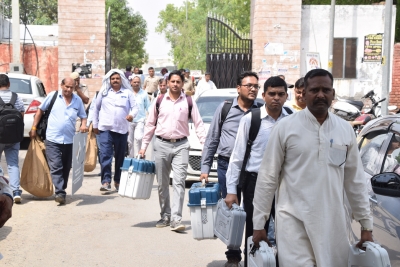Chandigarh: Nearly two crore voters, comprising 94 lakh women, in BJP-ruled Haryana on May 25 will decide the fate of 223 candidates, including two Union ministers, Rao Inderjit Singh and Krishan Pal Gurjar, after weeks of heated campaign for 10 parliamentary seats in the sixth phase of the Lok Sabha elections.
The other heavyweights in the fray include Deepender Hooda and former Union minister Kumari Selja, both from Congress and two-time chief minister Manohar Lal Khattar of the BJP are among the contestants.
Three-time Hooda is on the ballot in the family Jat-dominated bastion Rohtak, while four-time MP Selja is trying her luck in Sirsa (reserved), the seat she twice represented in the Lok Sabha and Khattar, an RSS man with a clean image, is ensuring win in his maiden Lok Sabha battle in Karnal.
BJP’s Naveen Jindal (54) is the youngest son of the richest woman in India, Savitri Jindal. Switched from the Congress to the BJP in March, he’s in the fray from Kurukshetra, the seat he represented between 2004 and 2014.
Jindal will take on AAP candidate and former Rajya Sabha MP Sushil Gupta. The AAP is contesting the Lok Sabha elections in Haryana in an alliance with Congress and has been given Kurukshetra.
Likewise, BJP has fielded Ashok Tanwar from Sirsa, the seat he represented as a Congress MP from 2009 to 2014. Before switching to the BJP in January, he was with the Aam Aadmi Party.
The other candidates on the list are four-time MP Arvind Sharma, a surgeon by profession, who is in the fray from Rohtak the BJP nominee.
The state is also witnessing a fratricidal battle within the clan of one of Haryana’s tallest Jat leaders and former Deputy Prime Minister Chaudhary Devi Lal, whose founded regional party, the Indian National Lok Dal (INLD), and its offshoot outfit Jannayak Janta Party (JJP) are floundering.
Ranjit Singh, who is Devi Lal’s youngest son, and Singh’s two daughters-in-law of his eldest brother and five-time chief minister O.P. Chautala face one another in the dynastic supremacy feud from Hisar seat.
While Ranjit Singh, a Cabinet minister in the state government, is the BJP nominee, his two ‘bahus’ — Naina Chautala and Sunaina Chautala are the JJP and the INLD candidates, respectively.
While Naina is the mother of former Deputy Chief Minister Dushyant Chautala and wife of Ajay Chautala, who is Devi Lal’s grandson, Sunaina is the wife of Ravi Chautala, who is a son of INLD patriarch O.P. Chautala’s elder brother Pratap Chautala.
Besides the Lok Sabha polls, there is a by-poll for the Karnal assembly seat, the seat vacated by Khattar, where Chief Minister Nayab Singh Saini, the outgoing MP in the Lok Sabha from Kurukshetra, is among the nine candidates in the fray. Saini had replaced Khattar as the chief minister in March.
Amidst the blistering heatwave, the polling for the simultaneous elections to Lok Sabha and the lone assembly seat will be held from 7 am to 6 pm in the sixth round of the seven-phase elections. Votes will be counted on June 4.
The main Opposition Congress is banking on “anti-incumbency” against BJP’s 10-year rule in the state, besides anger among Jats, rising crime graph and unemployment, while the BJP is banking on “Modi Magic” to retain all parliamentary seats.
Ground reports indicate a neck-and-neck contest between the BJP and the Congress.
Regional outfits the INLD and the JJP, bank heavily on its traditional Jat votes, comprising 28 per cent of the state’s population, are contesting on seven and 10 seats, respectively. The BSP has fielded candidates for nine seats.
This time, to save their “sinking ships” both the INLD and the JJP face a tough contest from the Congress, led by prominent Jat leader and two-time Chief Minister Bhupinder Hooda. However, the BJP banks on non-Jat upper caste politics, despite getting 50 per cent of Jat votes in the 2019 Lok Sabha polls.
Chief Minister Saini belongs to the Other Backward Classes (OBC) community, which comprises 21 per cent of the state’s electorate.
It has renominated two sitting OBC MPs — Krishan Pal Gurjar and Rao Inderjeet Singh — from Faridabad and Gurugram, respectively.
Chief Electoral Officer Anurag Agarwal told IANS that 19,812 polling stations have been set up in the state.
In addition, 219 temporary polling stations have also been set up. Extra arrangements have been made at all polling stations keeping in mind the heatwave.
Director General of Police Shatrujeet Kapur said over 35,000 police personnel, 112 companies of paramilitary forces and over 24,000 home guards would be deployed for the elections.
Additionally, 300 checkpoints will be established at intra-state and inter-state borders.
The state will have 10,343 polling locations. Among these, 1,362 locations with 3,033 booths have been identified as critical and 51 booths as vulnerable, necessitating additional police presence.
There will be 418 flying squads, 415 static surveillance teams, and 34 quick response teams. A total of 1,039 patrolling parties will ensure compliance with law and order and the model code of conduct, operating round-the-clock, he added.
In 2019, the BJP won all 10 constituencies, with a vote share of 58 per cent, improving its tally from 2014 when it managed to win seven out of the eight constituencies it had contested.
However, BJP’s vote share slipped to 22 per cent in the assembly polls in October 2019.
(Vishal Gulati can be contacted at gulatiians@gmail.com)
–IANS


Comments are closed.